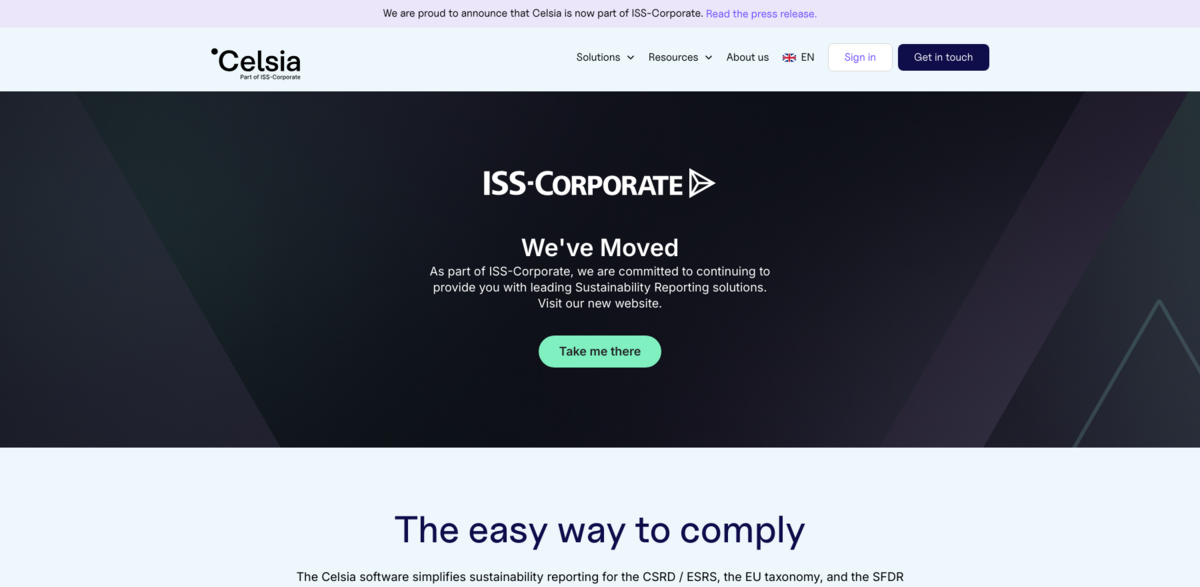What is Celsia and Its New Chapter with ISS-Corporate?
Big news in the world of corporate sustainability reporting: Celsia is now part of ISS-Corporate. For those who might not be familiar, ISS-Corporate is a top player offering solutions in compensation, governance, cyber risk monitoring, and sustainability — all aimed at boosting shareholder value and cutting down risks. Celsia, based in Oslo and founded in 2021, brings to the table SaaS solutions that make sustainability reporting a breeze, especially when it comes to the European Union’s Corporate Sustainability Reporting Directive (CSRD). This acquisition marks a significant step forward in helping companies navigate the complex landscape of sustainability regulations.
Main Benefits and Key Figures of Celsia’s Offering
Celsia’s software isn’t just another tool — it’s a game changer for companies tackling sustainability reporting. Here’s why:
- Supports the EU’s Corporate Sustainability Reporting Directive (CSRD) and the European Sustainability Reporting Standards.
- Helps with EU Taxonomy and Sustainable Finance Disclosure Regulation reporting requirements.
- Trusted by over 300 companies for accurate and timely sustainability reporting.
- Users report time savings of up to 80% compared to traditional reporting methods.
- The EU estimates that sustainability reporting costs companies around €320,000 annually.
- By 2027, about 50,000 EU/EEA companies will need to comply with CSRD, with total reporting costs projected at €9.9 billion.
- Approximately 10% of these costs are expected to flow to SaaS providers like Celsia.
How Celsia Simplifies the Reporting Process
One of the standout features of Celsia’s software is its ability to automate CSRD reporting workflows. Imagine having all your relevant data and documentation neatly stored in one place — no more hunting around or juggling spreadsheets. Plus, the Celsia team, packed with sustainability and tech experts, offers gap analysis, double materiality assessments, and keeps the software updated. This means clients get support from the initial data collection right through to a polished, ready-to-submit report.
Expertise That Stays Intact
Even with the acquisition, Celsia’s team remains intact, continuing to report to CEO and Co-Founder Petter Reistad. This continuity ensures that the expertise and personalized support clients have come to rely on won’t skip a beat. It’s a win-win — clients benefit from ISS-Corporate’s broader resources while still enjoying the dedicated, knowledgeable support from Celsia’s original team.
Real-World Impact: EU Taxonomy Made Easy
Clients rave about how Celsia has demystified the EU taxonomy — a framework designed to measure and prove sustainability efforts across industries. One user shared how the platform helped them map out the complex regulations, leverage sustainability initiatives, and plan ahead. The software’s intuitive design means companies can fully own their sustainability data and make informed, data-driven decisions, like assessing the sustainability of hydropower plants. It’s all about turning complicated legislation into simple, actionable steps.
Project Impact on Sustainable Development Goals (SDGs)
- SDG 7: Affordable and Clean Energy
- SDG 9: Industry, Innovation, and Infrastructure
- SDG 12: Responsible Consumption and Production
- SDG 13: Climate Action
- SDG 17: Partnerships for the Goals
Why Celsia’s Reporting Workflows Stand Out
Celsia’s platform covers every step of the sustainability reporting journey with simple, guided workflows. Need to export your report? Just a click, and you’ve got it in Word format, ready to share. This ease of use, combined with expert guidance, makes sustainability reporting less of a headache and more of a strategic advantage. For companies gearing up to meet stringent EU regulations, Celsia offers a clear path forward — efficient, accurate, and user-friendly.


















